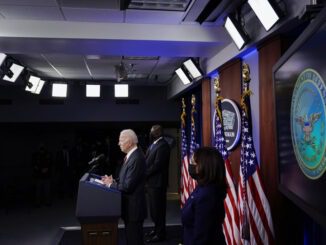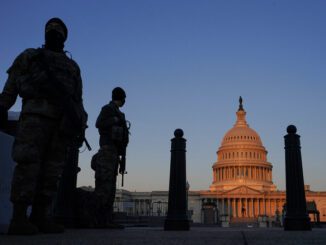
An aide to Defense Secretary Lloyd Austin asked first responders to avoid using lights and sirens in requesting an ambulance be sent to Austin’s northern Virginia home after he had complications from surgery for prostate cancer that he had kept secret from senior Biden administration leaders and staff.
Austin was hospitalized Jan. 1 and admitted to intensive care after developing an infection a week after undergoing surgery. He was released from Walter Reed National Military Medical Center on Monday.
On the Jan. 1 call to the Fairfax County Department of Public Safety, a man who identified himself as a government employee described Austin as alert. The identity of Austin and the caller were redacted from a copy of the 911 audio, which was obtained by The Associated Press under the Freedom of Information Act. The caller named the street on which Austin lives.
In the four-minute call, the reason for needing the ambulance also was redacted. The caller said Austin was not having chest pains.
“Can I ask, like, can the ambulance not show up with lights and sirens? Um, we’re trying to remain a little subtle,” the aide said, according to the recording.
A dispatcher responded that the ambulance would comply once it got near the home.
“Usually when they turn into a residential neighborhood, they’ll turn them off,” the dispatcher said, adding that emergency sirens and lights are required by law on major roads when ambulances are responding to a call.
Austin was located on the ground floor of the residence, said the aide, who indicated he would be waiting outside for the ambulance.
The caller asked how long it would take to get to the home. The dispatcher said it depended on traffic and road conditions and said first responders would be arriving from the closest available station.
Details of the 911 audio file from the Fairfax County Public Safety Department were first reported by The Daily Beast.
As he recovers, Austin will be working from home. His doctors said he “progressed well throughout his stay and his strength is rebounding.” They said in a statement the cancer was treated early and his prognosis is “excellent.”
Austin, 70, was admitted to Walter Reed National Military Medical Center on Dec. 22 and underwent surgery to treat the cancer, which was detected earlier in the month during a routine screening.
Dr. John Maddox, the trauma medical director, and Dr. Gregory Chesnut, the director of the Center for Prostate Disease Research at Walter Reed, said that during Austin’s hospitalization he underwent medical tests and was treated for lingering leg pain. They said he has physical therapy to do but there are no plans for further cancer treatment other than regular checks.
President Joe Biden and senior administration officials were not told about Austin’s hospitalization until Jan. 4, and Austin kept the cancer diagnosis secret until Jan. 9. Biden has said Austin’s failure to tell him about the hospitalization was a lapse in judgment, but the Democratic president insists he still has confidence in his Pentagon chief.
During Austin’s time at Walter Reed, the U.S. launched a series of military strikes late last week on the Iranian-backed Houthis in Yemen, targeting dozens of locations linked to their campaign of assaults on commercial shipping in the Red Sea. Working from his hospital bed, Austin juggled calls with senior military leaders, including Gen. Erik Kurilla, head of U.S. Central Command, and White House meetings to review, order and ultimately watch the strikes unfold over secure video.
The lack of transparency about Austin’s hospitalization, however, has triggered administration and Defense Department reviews on the procedures for notifying the White House and others if a Cabinet member must transfer decision-making authorities to a deputy, as Austin did during his initial surgery and a portion of his latest hospital stay. And the White House chief of staff ordered Cabinet members to notify his office if they ever can’t perform their duties.
Austin’s secrecy also drew criticism from Congress members on both sides of the political aisle, and Rep. Mike Rogers, an Alabama Republican who is chairman of the House Armed Services Committee, said he has opened a formal inquiry into the matter. Others openly called for Austin to resign, but the White House has said the Pentagon chief’s job is safe.
It is still unclear when Austin will return to his office in the Pentagon or how his cancer treatment will affect his job, travel and other public engagements going forward. Deputy Defense Secretary Kathleen Hicks has been taking on some of his day-to-day duties as he recovers.



